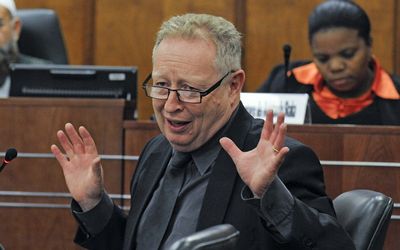Corruption Watch admitted as ‘friend of court’ in Motsoeneng appeal case
by Staff Writer,
2015-08-24 17:18:33.0
CORRUPTION Watch has been granted leave to intervene as amicus curiae in a matter between the chief operating officer of the South African Broadcasting Corporation (SABC)‚ Hlaudi Motsoeneng‚ and the Democratic Alliance and others, which is on appeal from the Cape High Court and will involve a determination of the nature and status of remedial directions of the public protector.
An amicus curiae is a friend of the court or someone who is not a party to a case and offers information that bears on the case, but who has not been solicited by any of the parties to assist in a court case.
On October 24 last year, Western Cape High Court Judge Ashton Schippers ordered that the SABC board institute disciplinary proceedings against Mr Motsoeneng for‚ among other alleged infringements‚ abuse of power‚ lying about his qualifications and purging staff at the public broadcaster.
Mr Motsoeneng appealed against the High Court decision and the Supreme Court of Appeal must now decide whether he should be suspended by the public broadcaster’s board.
The High Court ruling followed a finding by Public Protector Thuli Madonsela that the SABC board should take action against Mr Motsoeneng.
Instead of implementing Ms Madonsela’s remedial action, however‚ the board recommended to Communications Minister Faith Muthambi that Mr Motsoeneng‚ who was the acting chief operating officer at the time‚ be appointed permanently in the position‚ a decision which the minister endorsed.
In its decision‚ the High Court found that the public protector may merely make recommendations as to what action should be taken to address malfeasance by the state or by a state official and that such recommendations may be ignored as long as there is a rational basis for doing so‚ Corruption Watch said.
The watchdog body said its submissions are limited to the proper interpretation of section 182 of the Constitution, which confers the power on the public protector to "take appropriate remedial action" in the face of a finding of malfeasance by the state or a state official.
David Lewis‚ executive director of Corruption Watch‚ said: "Over the past year the lack of respect shown to the office of the public protector by the executive and members of the legislature and their response to her findings in a number of important investigations make it imperative that the courts determine her powers.
"It is in order to assist in resolving this key question that we have been granted the right to participate in this matter as a friend of the court. We intend to use this opportunity to persuade the court that the public protector’s remedial directions are indeed binding‚ subject to judicial review."
Corruption Watch has therefore submitted that the language‚ history and purpose of section 182(1)(C) of the Constitution intends for the public protector to have the power to provide an effective remedy for state misconduct and that remedial directions issued by the office of the public protector are binding and subject to judicial review.
RDM News Wire

David Lewis. Picture: TREVOR SAMSON
CORRUPTION Watch has been granted leave to intervene as amicus curiae in a matter between the chief operating officer of the South African Broadcasting Corporation (SABC)‚ Hlaudi Motsoeneng‚ and the Democratic Alliance and others, which is on appeal from the Cape High Court and will involve a determination of the nature and status of remedial directions of the public protector.
An amicus curiae is a friend of the court or someone who is not a party to a case and offers information that bears on the case, but who has not been solicited by any of the parties to assist in a court case.
On October 24 last year, Western Cape High Court Judge Ashton Schippers ordered that the SABC board institute disciplinary proceedings against Mr Motsoeneng for‚ among other alleged infringements‚ abuse of power‚ lying about his qualifications and purging staff at the public broadcaster.
Mr Motsoeneng appealed against the High Court decision and the Supreme Court of Appeal must now decide whether he should be suspended by the public broadcaster’s board.
The High Court ruling followed a finding by Public Protector Thuli Madonsela that the SABC board should take action against Mr Motsoeneng.
Instead of implementing Ms Madonsela’s remedial action, however‚ the board recommended to Communications Minister Faith Muthambi that Mr Motsoeneng‚ who was the acting chief operating officer at the time‚ be appointed permanently in the position‚ a decision which the minister endorsed.
In its decision‚ the High Court found that the public protector may merely make recommendations as to what action should be taken to address malfeasance by the state or by a state official and that such recommendations may be ignored as long as there is a rational basis for doing so‚ Corruption Watch said.
The watchdog body said its submissions are limited to the proper interpretation of section 182 of the Constitution, which confers the power on the public protector to "take appropriate remedial action" in the face of a finding of malfeasance by the state or a state official.
David Lewis‚ executive director of Corruption Watch‚ said: "Over the past year the lack of respect shown to the office of the public protector by the executive and members of the legislature and their response to her findings in a number of important investigations make it imperative that the courts determine her powers.
"It is in order to assist in resolving this key question that we have been granted the right to participate in this matter as a friend of the court. We intend to use this opportunity to persuade the court that the public protector’s remedial directions are indeed binding‚ subject to judicial review."
Corruption Watch has therefore submitted that the language‚ history and purpose of section 182(1)(C) of the Constitution intends for the public protector to have the power to provide an effective remedy for state misconduct and that remedial directions issued by the office of the public protector are binding and subject to judicial review.
RDM News Wire




























Change: -2.60%
Change: -2.88%
Change: -2.44%
Change: -2.44%
Change: -5.26%
Data supplied by Profile Data
Change: 0.00%
Change: 0.00%
Change: -2.60%
Change: 0.00%
Change: 0.00%
Data supplied by Profile Data
Change: 1.98%
Change: -0.06%
Change: -0.19%
Change: -0.09%
Change: 0.57%
Data supplied by Profile Data
Change: 0.00%
Change: 0.00%
Change: 0.00%
Change: 0.00%
Change: 0.00%
Data supplied by Profile Data